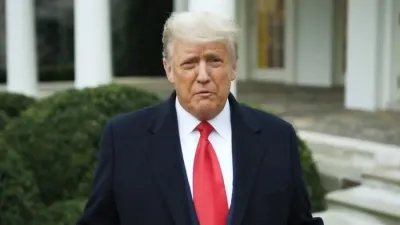Will the Tensions Between India and Pakistan End Soon?

Synopsis
Key Takeaways
- US President Donald Trump hopes for a swift resolution to the India-Pakistan conflict.
- India's military actions target known terrorist camps while avoiding civilian casualties.
- Pakistan's denial of involvement includes accusations against India.
- The situation is dynamic and requires careful monitoring from international communities.
- Regional stability in South Asia is at risk due to rising tensions.
Washington, May 7 (NationPress) US President Donald Trump expressed his thoughts on Tuesday regarding the Indian military actions against Pakistan, stating that such actions were anticipated and that he “hopes it concludes swiftly.”
The Indian embassy in Washington DC released a statement indicating that India’s National Security Adviser, Ajit Doval, informed Secretary of State Marco Rubio, who is also serving as the National Security Adviser, about the military actions taken.
“It’s unfortunate,” President Trump remarked during an unrelated press interaction at the White House. “We were just informed as we entered the Oval ... The two nations have been in conflict for a long time. ... My hope is that it resolves quickly.”
The Indian embassy noted, “Following the strikes, NSA Ajit Doval briefed US NSA and Secretary of State Marco Rubio on the actions taken.”
They further stated: “India’s military actions have been targeted and precise. They were calculated, responsible, and aimed at being non-escalatory. No civilian, economic, or military targets in Pakistan were affected. Only recognized terror camps were struck.”
The embassy emphasized that India possesses “credible leads, technical data, survivor testimonies, and additional evidence indicating the clear involvement of Pakistan-based terrorists in this incident,” and anticipated that Pakistan would act against the attackers.
“Instead, over the past two weeks, Pakistan has resorted to denial and accusations of false flag operations against India,” the statement continued.
President Trump’s comments were the first from a US official following the military actions. Earlier, Tammy Bruce, spokesperson for the State Department, indicated that the situation between India and Pakistan is “a dynamic and serious matter.”
Previously, the Indian Army reported that it had targeted nine locations deep within Pakistan in retaliation for the Pahalgam terrorist attack.
“Recently, the Indian Armed Forces commenced ‘Operation Sindoor’, targeting terrorist infrastructure in Pakistan and Pakistan-occupied Jammu and Kashmir, from where attacks against India have been orchestrated,” the army stated in a press release.
The Indian Army also shared on its official X handle, “Justice is Served. Jai Hind.”
“In total, nine (9) sites have been struck. Our operations have been focused, measured, and non-escalatory. No military installations in Pakistan were targeted. India has shown significant restraint in selecting targets and executing operations,” the army affirmed.
This action follows the brutal Pahalgam terrorist attack that resulted in the deaths of 25 Indians and one Nepali citizen.
“We are committed to ensuring accountability for those responsible for this heinous attack. A comprehensive briefing on ‘Operation Sindoor’ is scheduled for later today,” the army announced.
Meanwhile, the Pakistani Inter-Services Public Relations (ISPR) Director General Lt Gen Ahmed Sharif Chaudhry confirmed the strikes on Pakistan.
“The missiles were launched by India targeting Kotli, Bahwalpur, and Muzaffarabad in a cowardly act amid heightened tensions between the two nations following a militant attack in occupied Kashmir,” the Pakistan army reported.
The rising tension between these nuclear powers is a direct consequence of the Pahalgam terror attack, which claimed the lives of 26 civilians, predominantly tourists.










